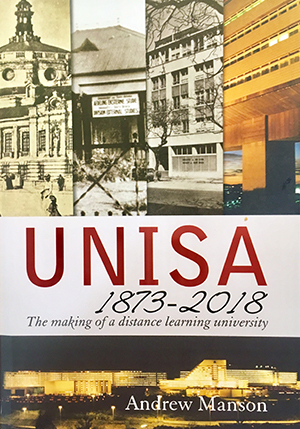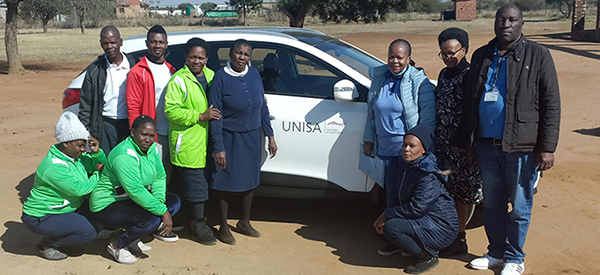Leading change
New book examines Unisa’s contradictory and paradoxical nature

Launched during an event themed The University of South Africa and South African universities in transition on 7 September, the latest contribution to Unisa’s institutional memory received both praise and constructive criticism.
An honest examination
Following a welcome address by Prof Mandla Makhanya, Unisa Principal and Vice-Chancellor, and an introduction by Prof Russel Viljoen, Unisa History and Memory Project Leader, author Prof Andrew Manson said that the purpose of Unisa 1873 – 2018: The making of a distance learning university is self-reflection on where Unisa is, where it has come from and where it is going. He said that the publication is not a mere celebratory account of Unisa’s past which presents an uncritical catalogue of the university’s past achievements. ‘It strives to provide a critical and objective perspective,’ said Manson. ‘Unisa Principal and Vice-Chancellor Prof Makhanya initiated the project and he insisted that the book should cast a critical eye on what has happened in the past, and how that shapes Unisa’s present and future. The previous attempt at tracking Unisa’s academic history was in 1948, when a thesis on the topic was published as an archive publication. This book addresses the gap between then and now. The transition to democracy allows us to examine the past more critically and openly.’
About periods, not people
Manson said that the book is based largely though not exclusively on official sources: records of council, records of senate, Unisa bulletins, and personal papers of past Vice-Chancellors (VCs). ‘Although each VC brought his own perspective to the university, this book is not about them. Rather, it is about what happened at the university during the stewardship of each VC. This book is there to lay a foundation for future publications.’

Prof Andrew Manson
The author said that the book reflects the changing character of the institution and the contradictory and paradoxical nature of Unisa. ‘Unisa began as an examining university imbued with Anglophile, Cape liberal imperial traditions,’ said Manson. ‘It then metamorphosed into a predominantly Afrikaner institution in the inter-war years, more attuned to the needs of Afrikaner nationalism, supporting the broad objectives of the National Party project. Most recently it recalibrated itself as the African university in the service of humanity in the democratic era. The book describes all these quite fundamental changes in the institution. Yet it was the only university that consistently provided higher education to black people. Unisa is highly durable and highly skilled in the art of reinvention.’
Constructive criticism
Main discussants Prof Zodwa Motsa, Director: Scholarship at Unisa’s Change Management Unit and Prof Vuyisile Msila, Director: Leadership in Higher Education at the Change Management Unit welcomed the publication of the book while also pointing out deficiencies.
Motsa said the book is a very significant contribution to the Unisa historical repository. ‘It is thoroughly researched and meticulously recorded, she said. ‘Yet there is an imbalance in the sense that the voices in the margins are silent. Sources are VCs and one Chair of Council. This is an elitist cast, and ‘ordinary’ people were not consulted.’
Msila said that some of the sections of the book really drained him, especially the details of what was happening during the apartheid era. ‘However, this is a huge elephant in the room, and you did not shy away from discussing it,’ he told the author. Msila pointed out that the actual history of teaching and learning, and transformation in this area, as well as the change initiatives of the university are not covered in this book.
In his response to the main discussants, Manson said that the points they made were all valid and should form part of further volumes in the future created by multiple authors. He said that the intention was always for the book to be a starting point for further works that explore the various areas pointed out.

From left) Prof Mandla Makhanya, Unisa Principal and Vice-Chancellor, Prof Russel Viljoen, Unisa History and Memory Project Leader, and main discussants Prof Zodwa Motsa, Director: Scholarship at Unisa’s Change Management Unit and Prof Vuyisile Msila, Director: Leadership in Higher Education at the Change Management Unit
Other discussants who commented on the book from the perspectives of the organisations they represent were NSRC President Zandile Sodladla, APSA General Secretary Johan Jonker, Unisa Women’s Forum President Sheila Kumalo and Black Forum President Prof Humphrey Mogashoa.
The book is available from Unisa Press – click here for details.
* By Philip van der Merwe
Publish date: 2018/09/11